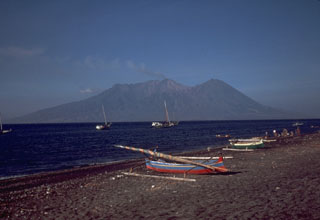Report on Sangeang Api (Indonesia) — July 1986
Scientific Event Alert Network Bulletin, vol. 11, no. 7 (July 1986)
Managing Editor: Lindsay McClelland.
Sangeang Api (Indonesia) Ash clouds; red glow above crater
Please cite this report as:
Global Volcanism Program, 1986. Report on Sangeang Api (Indonesia) (McClelland, L., ed.). Scientific Event Alert Network Bulletin, 11:7. Smithsonian Institution. https://doi.org/10.5479/si.GVP.SEAN198607-264050
Sangeang Api
Indonesia
8.2°S, 119.07°E; summit elev. 1912 m
All times are local (unless otherwise noted)
Sangeang Api has been in continuous eruption for a year. Activity in July included several explosions/day, producing eruption clouds . . . ~1 km above the summit. A persistent reddish glow was visible at night above the Doro Api crater.
Geological Summary. Sangeang Api volcano, one of the most active in the Lesser Sunda Islands, forms a small 13-km-wide island off the NE coast of Sumbawa Island. Two large trachybasaltic-to-tranchyandesitic volcanic cones, Doro Api and Doro Mantoi, were constructed in the center and on the eastern rim, respectively, of an older, largely obscured caldera. Flank vents occur on the south side of Doro Mantoi and near the northern coast. Intermittent eruptions have been recorded since 1512, most of them during in the 20th century.
Information Contacts: L. Pardyanto, Olas, Kaswanda, Suratman, A. Sudradjat, and T. Casadevall, VSI.

